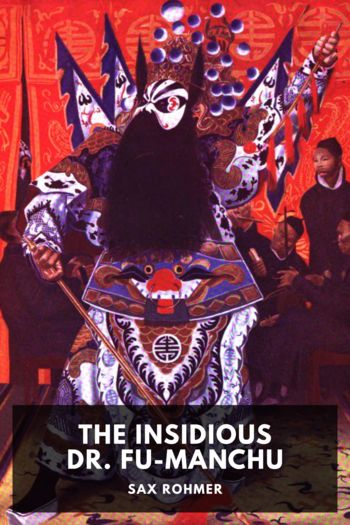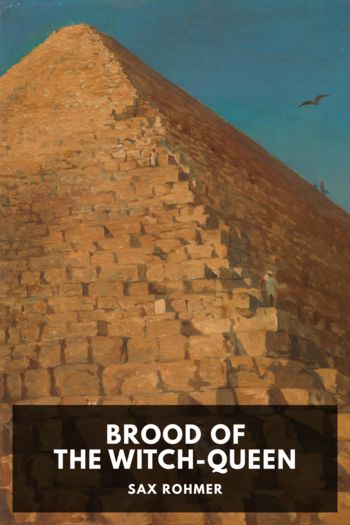The Insidious Dr. Fu-Manchu - Sax Rohmer (best finance books of all time .TXT) 📗

- Author: Sax Rohmer
Book online «The Insidious Dr. Fu-Manchu - Sax Rohmer (best finance books of all time .TXT) 📗». Author Sax Rohmer
A cab had dropped us at the corner. We both wore dark suits and fez caps with black silk tassels. My complexion had been artificially reduced to a shade resembling the deep tan of my friend’s. He rang the bell beside the door.
Almost immediately it was opened by a negro woman—gross, hideously ugly.
Smith uttered something in voluble Arabic. As a linguist his attainments were a constant source of surprise. The jargons of the East, Far and Near, he spoke as his mother tongue. The woman immediately displayed the utmost servility, ushering us into an ill-lighted passage, with every evidence of profound respect. Following this passage, and passing an inner door, from beyond whence proceeded bursts of discordant music, we entered a little room bare of furniture, with coarse matting for mural decorations, and a patternless red carpet on the floor. In a niche burned a common metal lamp.
The negress left us, and close upon her departure entered a very aged man with a long patriarchal beard, who greeted my friend with dignified courtesy. Following a brief conversation, the aged Arab—for such he appeared to be—drew aside a strip of matting, revealing a dark recess. Placing his finger upon his lips, he silently invited us to enter.
We did so, and the mat was dropped behind us. The sounds of crude music were now much plainer, and as Smith slipped a little shutter aside I gave a start of surprise.
Beyond lay a fairly large apartment, having divans or low seats around three of its walls. These divans were occupied by a motley company of Turks, Egyptians, Greeks, and others; and I noted two Chinese. Most of them smoked cigarettes, and some were drinking. A girl was performing a sinuous dance upon the square carpet occupying the center of the floor, accompanied by a young negro woman upon a guitar and by several members of the assembly who clapped their hands to the music or hummed a low, monotonous melody.
Shortly after our entrance into the passage the dance terminated, and the dancer fled through a curtained door at the farther end of the room. A buzz of conversation arose.
“It is a sort of combined wekaleh and place of entertainment for a certain class of Oriental residents in, or visiting, London,” Smith whispered. “The old gentleman who has just left us is the proprietor or host. I have been here before on several occasions, but have always drawn blank.”
He was peering out eagerly into the strange clubroom.
“Whom do you expect to find here?” I asked.
“It is a recognized meeting-place,” said Smith in my ear. “It is almost a certainty that some of the Fu-Manchu group use it at times.”
Curiously I surveyed all these faces which were visible from the spyhole. My eyes rested particularly upon the two Chinamen.
“Do you recognize anyone?” I whispered.
“S-sh!”
Smith was craning his neck so as to command a sight of the doorway. He obstructed my view, and only by his tense attitude and some subtle wave of excitement which he communicated to me did I know that a new arrival was entering. The hum of conversation died away, and in the ensuing silence I heard the rustle of draperies. The newcomer was a woman, then. Fearful of making any noise I yet managed to get my eyes to the level of the shutter.
A woman in an elegant, flame-colored opera cloak was crossing the floor and coming in the direction of the spot where we were concealed. She wore a soft silk scarf about her head, a fold partly draped across her face. A momentary view I had of her—and wildly incongruous she looked in that place—and she had disappeared from sight, having approached someone invisible who sat upon the divan immediately beneath our point of vantage.
From the way in which the company gazed towards her, I divined that she was no habitué of the place, but that her presence there was as greatly surprising to those in the room as it was to me.
Whom could she be, this elegant lady who visited such a haunt—who, it would seem, was so anxious to disguise her identity, but who was dressed for a society function rather than for a midnight expedition of so unusual a character?
I began a whispered question, but Smith tugged at my arm to silence me. His excitement was intense. Had his keener powers enabled him to recognize the unknown?
A faint but most peculiar perfume stole to my nostrils, a perfume which seemed to contain the very soul of Eastern mystery. Only one woman known to me used that perfume—Karamanèh.
Then it was she!
At last my friend’s vigilance had been rewarded. Eagerly I bent forward. Smith literally quivered in anticipation of a discovery. Again the strange perfume was wafted to our hiding-place; and, glancing neither to right nor left, I saw Karamanèh—for that it was she I no longer doubted—recross the room and disappear.
“The man she spoke to,” hissed Smith. “We must see him! We must have him!”
He pulled the mat aside and stepped out into the anteroom. It was empty. Down the passage he led, and we were almost come to the door of the big room when it was thrown open and a man came rapidly out, opened the street door before Smith could reach him, and was gone, slamming it fast.
I can swear that we were not four seconds behind him, but when we gained the street it was empty. Our quarry had disappeared as if by magic. A big car was just turning the corner towards Leicester Square.
“That is the girl,” rapped Smith; “but where in Heaven’s name is the man to whom she brought the message? I would give a hundred pounds to know what business is afoot. To think that we have had such an opportunity and have thrown it away!”
Angry and nonplussed he stood at the corner, looking in the direction of the crowded thoroughfare into which the car had been driven, tugging at the lobe





Comments (0)